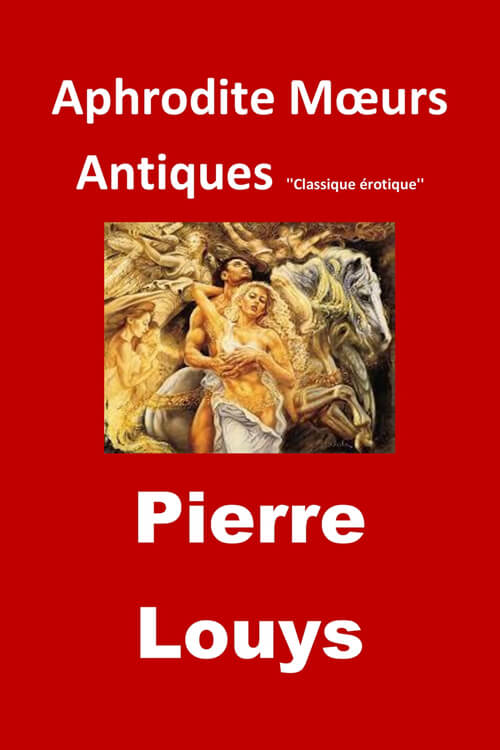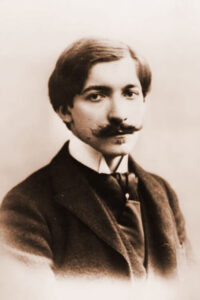
Aphrodite, Mœurs Antiques
Since she had awakened, two hours after mid-day, and quite tired from having slept too much, she had remained alone upon the disordered bed, one side covered by a vast flood of hair.
This mass of hair was deep and dazzling, soft as fur, longer than a wing, supple, numberless, full of life and warmth. It half-covered her back, spread itself under her body, and glittered to her very knees in thick and rounded ringlets. The young woman was rolled up in this precious fleece whose golden brown, almost metallic, reflections had caused the women of Alexandria to name her Chrysis.
It was not the smooth hair of the Syrians of the court, nor the tinted hair of the Asiatics, nor the brown and black hair of the daughters of Egypt. It was that of an Aryan race, of the Galilaeans from beyond the desert.
Chrysis. She loved that name. The young men who came to see her called her Chryse like Aphrodite in the verses which they left, with garlands of roses, at her door in the mornings. She did not believe in Aphrodite but she was pleased that they should compare her to the goddess, and she went sometimes to the temple to give her, as to a friend, boxes of perfume and blue veils.
She was born on the banks of the lake of Gennesaret in a country of shadow and sun, overrun with rose laurels. Her mother went in the evenings to wait upon the road to Jerusalem for travelers and merchants, amid the pastoral silence. She was a woman much respected in Galilee. The priests did not avoid her door for she was charitable and pious; the lambs of the sacrifice were always paid for by her, and the benediction of the Eternal extended over her house. But when she became enceinte, her condition was a matter of gossip—for she lived alone. A man who was celebrated for the gift of prophecy said that she would bear a daughter who would one day wear at her throat “the wealth and the faith of a nation.” She did not quite understand how that could be but she named the child Sarah—this is to say, Princess, in Hebrew. And this silenced the scandals.
Of this Chrysis had never known, the diviner having told her mother how dangerous it is to reveal to people prophecies of which they are the objects. She knew nothing of her future; wherefore she often thought of it. She recalled but little of her childhood and did not like to speak of it. The only very clear sentiment which had remained with her was of the fright and the. vexation which was caused every day by the anxious surveillance of her mother who, the hour being come to go forth upon the road, shut her up in their room for interminable hours. She recalled also the round window through which she saw the waters of the lake, the mist-blue fields, the transparent sky, and the light air of the Galilaean country. The house was surrounded by pink flax and tamarisks. Thorny caper bushes raised their green heads at hazard over the fine mist of the bluegrass. Little girls bathed in a limpid brook where red shells could be found under tufts of laurel blossoms. And there were flowers on the water, flowers in all the meadow, and great lilies on the mountains.
She was twelve years old when she escaped to follow a troop of young riders who were going to Tyre as merchants of ivory and whom she had chanced to meet beside a well. They had adorned their long-tailed horses with many-colored tufts. She recalled well how they carried her away, pale with joy, on their mounts, and how they had halted later for the night—a night so bright that not a star could be seen.
Read or download Book
Pierre Louÿs
Pierre-Félix Louÿs (10 December 1870 – 4 June 1925) was a French poet and writer, most renowned for lesbian and classical themes in some of his writings. He is known as a writer who sought to “express pagan sensuality with stylistic perfection”. He was made first a Chevalier and then an Officer of the Légion d’honneur for his contributions to French literature.
Life
Pierre Louÿs was born Pierre Félix Louis on 10 December 1870 in Ghent, Belgium, but relocated to France, where he spent the rest of his life. He studied at the École Alsacienne in Paris, and there he developed a good friendship with a future Nobel Prize winner and champion of homosexual rights, André Gide. From 1890 onwards, he began spelling his name as “Louÿs”, and pronouncing the final S, as a way of expressing his fondness for classical Greek culture (the letter Y is known in French as I grec or “Greek I”). During the 1890s, he became a friend of the Irish homosexual dramatist Oscar Wilde, and was the dedicatee of Wilde’s Salomé in its original (French) edition. Louÿs thereby was able to socialize with homosexuals. Louÿs started writing his first erotic texts at the age of 18, at which time he developed an interest in the Parnassian and Symbolist schools of writing.
Early writings
During 1891, Louÿs helped initiate a literary review, La Conque, where he proceeded to publish Astarte, an early collection of erotic verse already marked by his distinctive style. During 1894 he published another erotic collection of 143 prose poems, Songs of Bilitis (Les Chansons de Bilitis), this time with strong lesbian themes. It was divided into three sections, each representative of a phase of Bilitis’s life: Bucolics in Pamphylia, Elegies at Mytilene, and Epigrams in the Isle of Cyprus; dedicated to her was also a short Life of Bilitis and three epitaphs in The Tomb of Bilitis. What made The Songs sensational is Louÿs’s claim that the poems were the work of an ancient Greek courtesan and contemporary of Sappho, Bilitis; to himself, Louÿs ascribed the modest role of translator. The pretense did not last long, and “translator” Louÿs was soon revealed as Bilitis herself. This did little to discredit The Songs of Bilitis, however, as it was praised for its sensuality and refined style, even more extraordinary for the author’s compassionate portrayal of lesbian sexuality.






